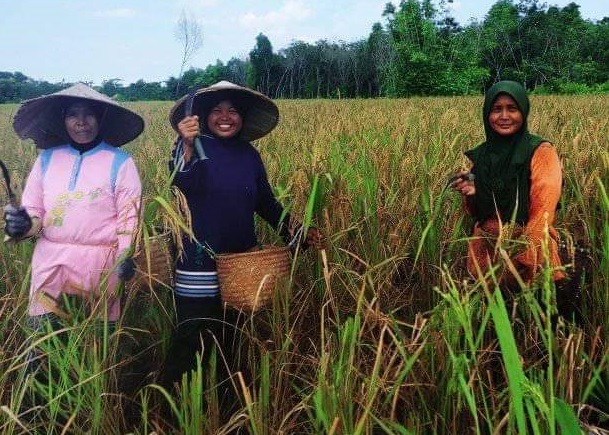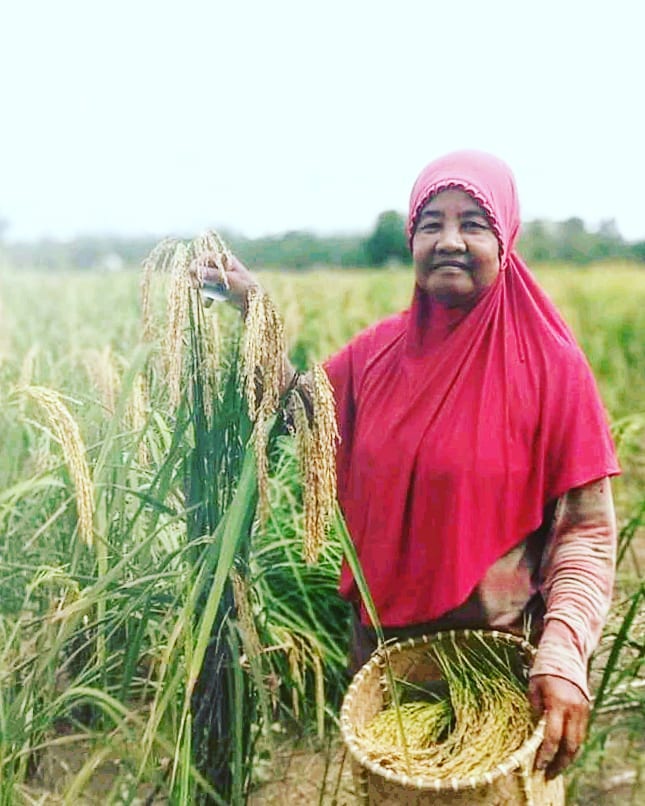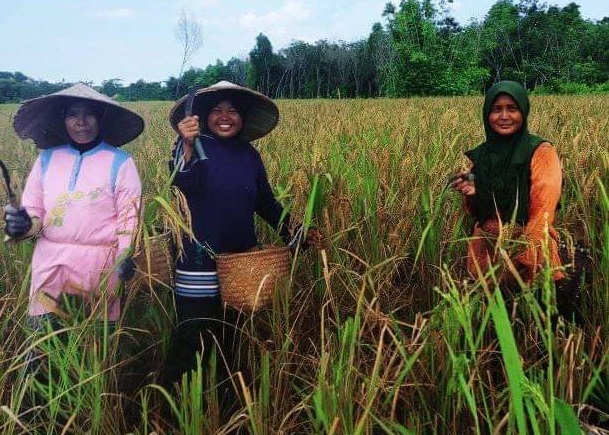In a small village of Pamah area, North Sumatra, Roky Saragih and the member peasants of Indonesian Peasants Union (SPI) have just finished harvesting chilli, shallots, and vegetables. Without much discussions, Rocky and family immediately go to their neighbour Rizal, who works as a daily wage worker. They give part of the harvest to Rizal’s family. “During this COVID-19 pandemic we continue to farm, because this is indeed our main income, and we don’t forget to share some of our produces for our neighbours who are affected [by COVID-19 situation],” Roky said.
Meanwhile, in Payaraman Village of Ogan Ilir, South Sumatra, Netty, an SPI woman peasant, along with other peasants, have just harvested rice. Neti also explained that the abundant rice yields this season is not only helping her family’s economy – but also become a source of food for her community who are not working in agriculture.

“Ikolah pecak gawe kami di dusun Rengas iko – when it is time to harvest rice, we work together to harvest, we work hand in hand to help from one field to another,” Netty explained with a thick accent of South Sumatra.
In Muaro Jambi, Jambi, Bondan and other SPI youth peasants also are distributing vegetables they just harvested to neighbours and communities around them. “In these difficult times, we have to work together, and we have to help each other. It is our contribution as a peasant community – to provide healthy and nutritious food.”
In the village of Cibeureum, West Java, Pandi, a young peasant, is organizing other members of his community to distribute vegetables to residents affected by COVID-19 crisis. “You guys just stay at home, let us do the farming to uphold food sovereignty, to provide food for the people,” Pandi said.
Among other initiatives in West Java, at Pasir Datar SPI peasants are sending carrots, leeks, and other vegetables to their Sukabumi office of West Java [in regent level]. Rozak Daud, the Chairperson of SPI Sukabumi conveyed that these vegetables will be distributed to workers and taxi drivers around the city of Sukabumi. “Hopefully this solidarity from the peasants can ease the food needs of urban people such as workers, and [motorcycle] taxi drivers,” Rozak said. In factories around Pasir Datar, several workers toil under precarious conditions, while taxi drivers are at the frontlines of food distribution in urban and peri-urban areas.
In Tuban, East Java, Kusnan, the Chairperson of the National Seed Center (P2N) of SPI distributed SPI-20 rice seeds and other crop seeds to peasants and non-peasants in the neighbourhood where he lived. “Do not let this pandemic diminish the spirit of solidarity among us,” he added.

Through traditional practices, the SPI-20 rice seeds have been saved and distributed widely among peasants all across Indonesia, for over two years. Peasants even got down to making masks. In Pati, Central Java. Siti Inayah, a representative of the SPI women’s wing, said that they distributed hand-made fabric masks among peasant families around Pati. “We hope that peasants and communities are in safe conditions while working on their land,” she suggested.
International Day of Peasant Struggles
Zainal Arifin Fuad, Chairperson of Serikat Petani Indonesia (SPI), said that as member of La Via Campesina, the peasants’ union commemorates 17 April as the International Day of Peasants’ Struggle. It is a moment to remind the world of the brutal massacre at Eldorado do Carajás in Brazil in 1996 and to stand in solidarity with peasant resistances everywhere.
“This year the 17 April commemoration is much more relevant as peasants continue to work on our farm amid COVID-19,” said Zainal in Jakarta.
“According to SOFI (The State of Food Security and Nutrition in the World) of FAO, the world’s hunger increased from 811 million to 821.6 million in 2019. On the other hand, the 2019 edition of the Global Report on Food Crises reported that around 113 million people face severe levels of food insecurity in 53 countries in 2018. The food crisis is already in a bad situation because of the neoliberal global food system. It will be even worse considering the current COVID-19 pandemic,” he added.
SPI General Secretary Agus Ruli Ardiansyah insisted that the Indonesian government must implement the promises of the ‘Indonesia Maju Program’ if it has to stave off a food crisis. The program, he reminded, aims to create a developed Indonesia that is sovereign, independent and based on collectivism and cooperation. “Put food sovereignty into practice. Continue the implementation of agrarian reform by distributing lands to workers, landless, and small farmers so they can produce food for local and national needs. Give incentives to peasants – because they are crucial for peasants to keep producing food for communities,” Ruli concluded.
This post is also available in Français.

